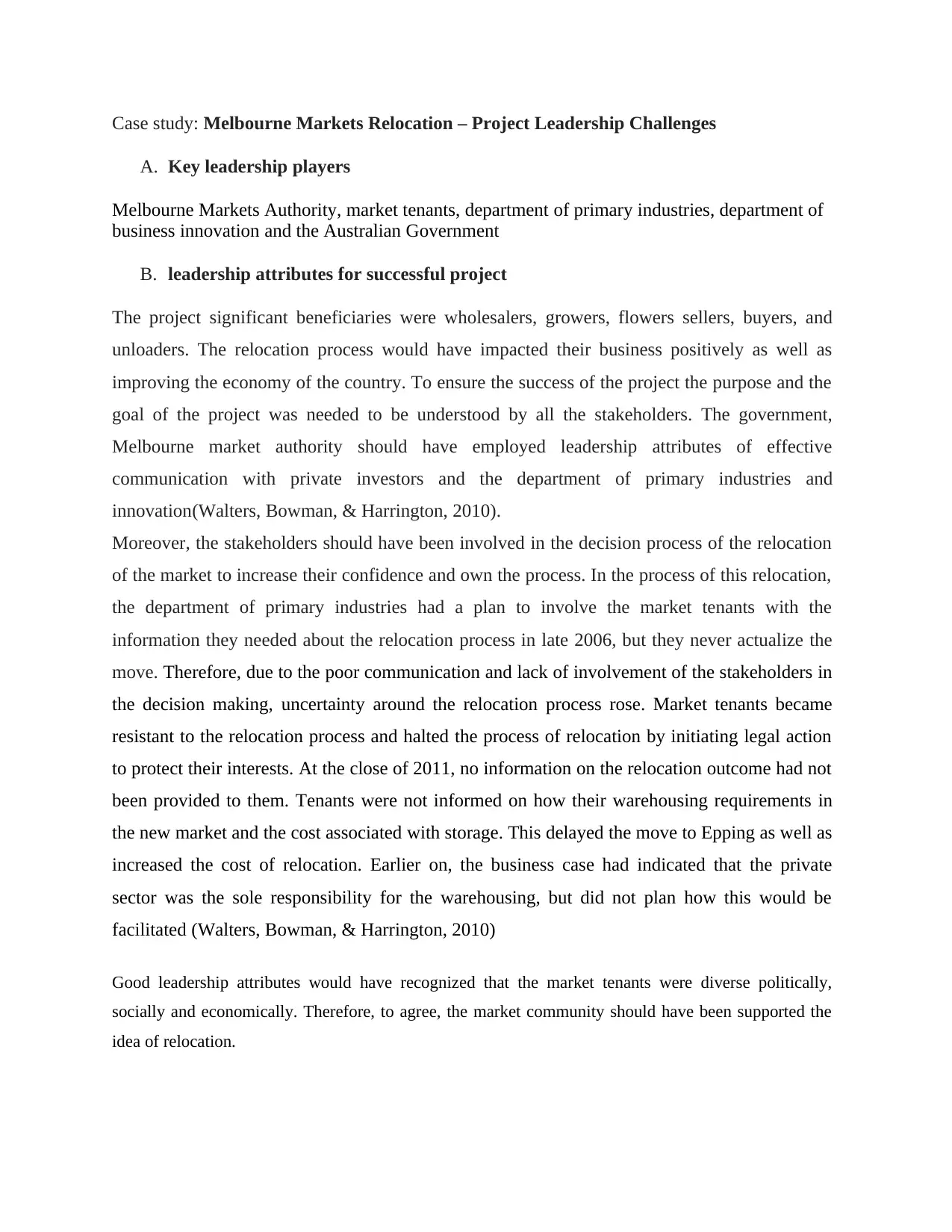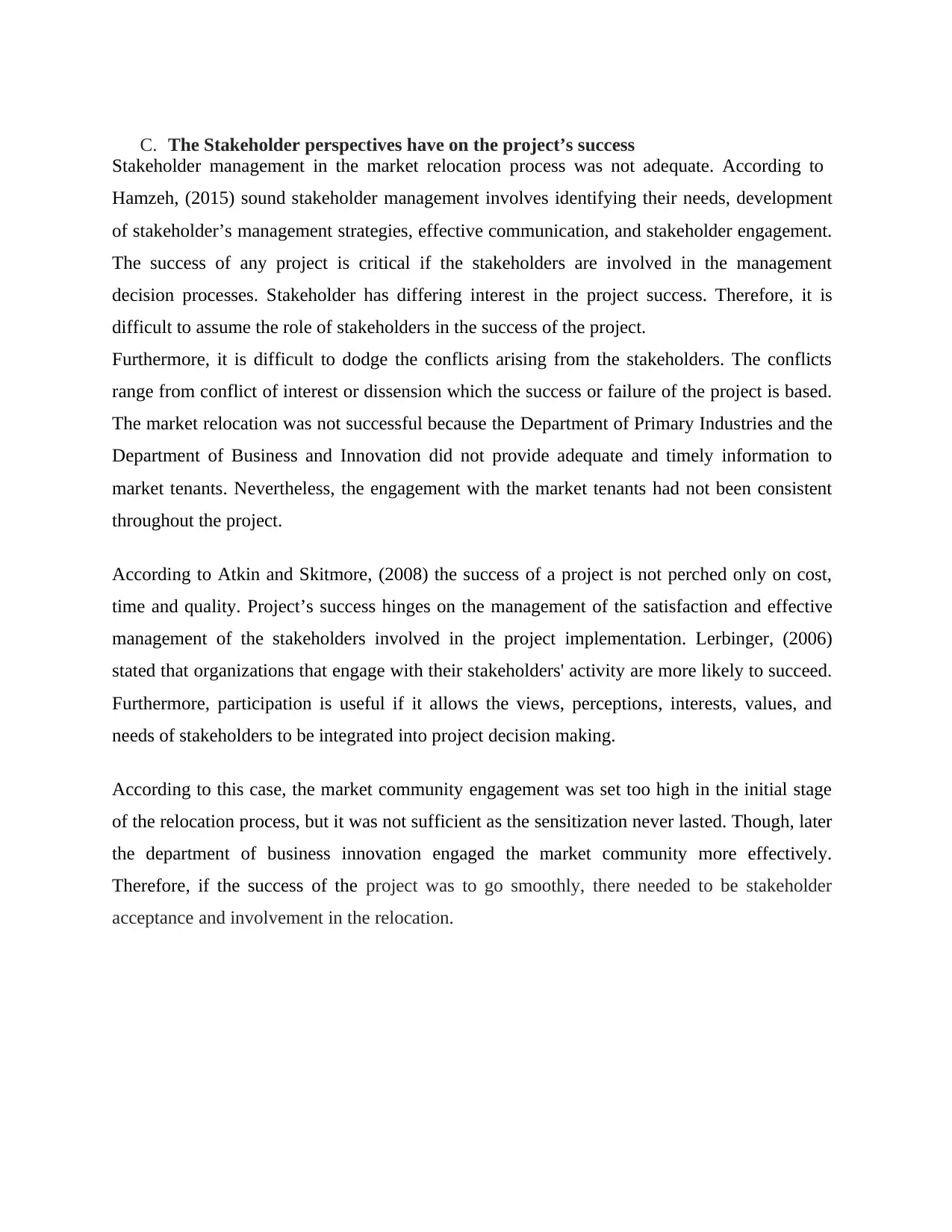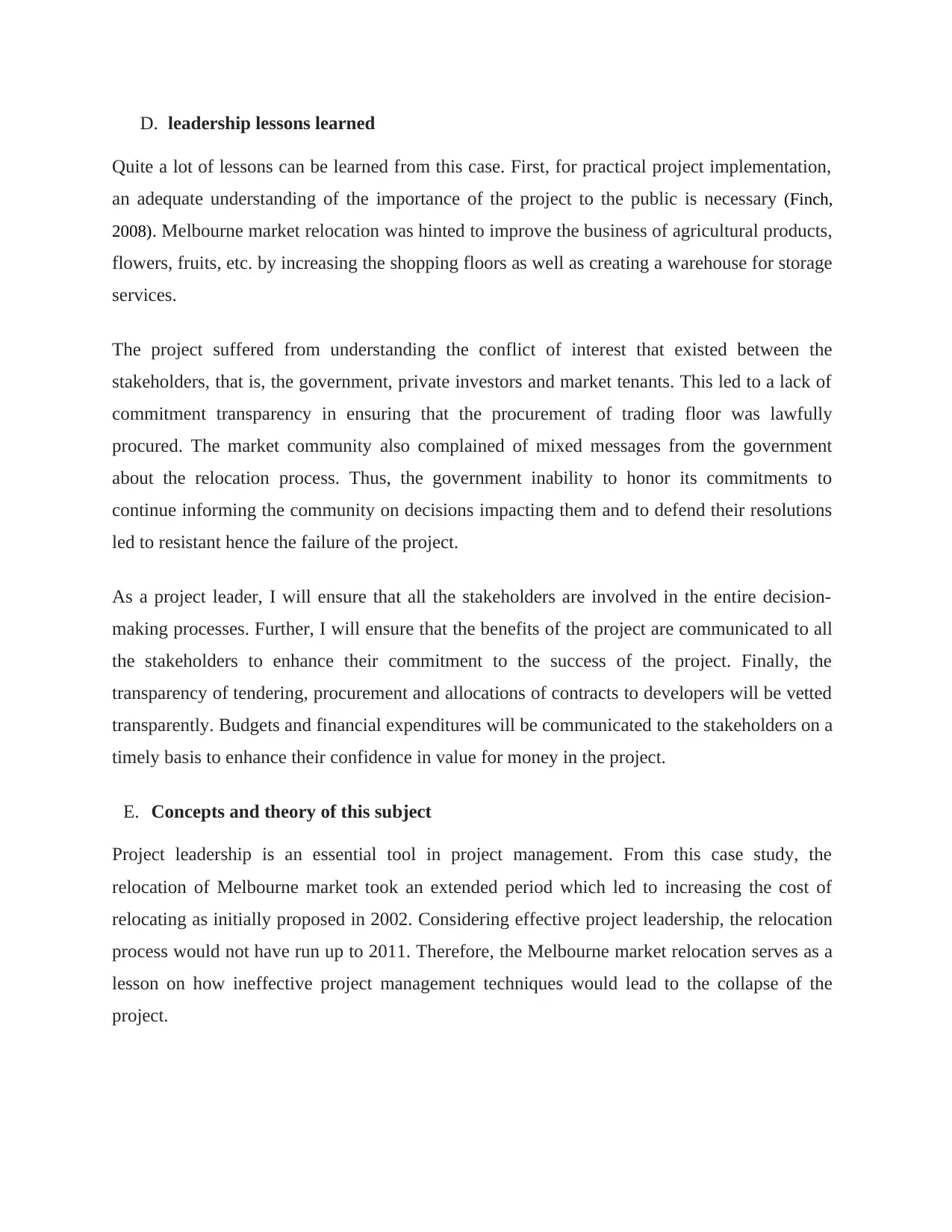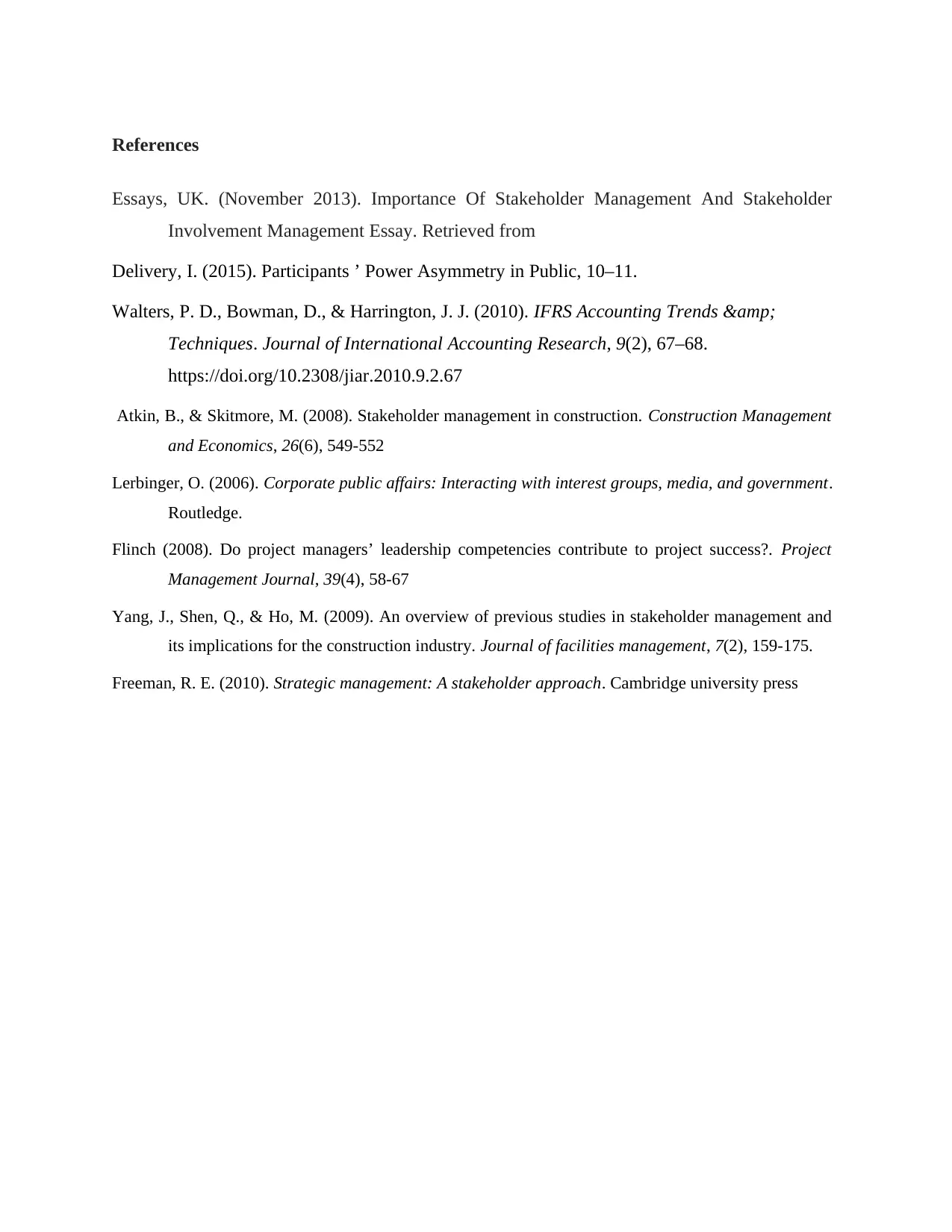MGT5PLS: Analyzing Leadership in Melbourne Markets Relocation Project
VerifiedAdded on 2023/06/07
|5
|1305
|470
Case Study
AI Summary
This case study examines the leadership challenges encountered during the Melbourne Markets relocation project, focusing on the roles of key players like the Melbourne Markets Authority, market tenants, and government departments. It highlights the importance of effective communication, stakeholder involvement, and understanding diverse perspectives for project success. The analysis reveals that inadequate stakeholder management, particularly a failure to provide timely information and consistent engagement with market tenants, led to resistance and project delays. Key leadership lessons include the necessity of understanding stakeholder interests, ensuring transparency in procurement processes, and maintaining open communication channels. Effective project leadership requires involving all stakeholders in decision-making, clearly communicating project benefits, and fostering confidence through transparent financial management. The case underscores how ineffective project management techniques can lead to project collapse, emphasizing the critical role of project leadership in achieving successful outcomes.

Case study: Melbourne Markets Relocation – Project Leadership Challenges
A. Key leadership players
Melbourne Markets Authority, market tenants, department of primary industries, department of
business innovation and the Australian Government
B. leadership attributes for successful project
The project significant beneficiaries were wholesalers, growers, flowers sellers, buyers, and
unloaders. The relocation process would have impacted their business positively as well as
improving the economy of the country. To ensure the success of the project the purpose and the
goal of the project was needed to be understood by all the stakeholders. The government,
Melbourne market authority should have employed leadership attributes of effective
communication with private investors and the department of primary industries and
innovation(Walters, Bowman, & Harrington, 2010).
Moreover, the stakeholders should have been involved in the decision process of the relocation
of the market to increase their confidence and own the process. In the process of this relocation,
the department of primary industries had a plan to involve the market tenants with the
information they needed about the relocation process in late 2006, but they never actualize the
move. Therefore, due to the poor communication and lack of involvement of the stakeholders in
the decision making, uncertainty around the relocation process rose. Market tenants became
resistant to the relocation process and halted the process of relocation by initiating legal action
to protect their interests. At the close of 2011, no information on the relocation outcome had not
been provided to them. Tenants were not informed on how their warehousing requirements in
the new market and the cost associated with storage. This delayed the move to Epping as well as
increased the cost of relocation. Earlier on, the business case had indicated that the private
sector was the sole responsibility for the warehousing, but did not plan how this would be
facilitated (Walters, Bowman, & Harrington, 2010)
Good leadership attributes would have recognized that the market tenants were diverse politically,
socially and economically. Therefore, to agree, the market community should have been supported the
idea of relocation.
A. Key leadership players
Melbourne Markets Authority, market tenants, department of primary industries, department of
business innovation and the Australian Government
B. leadership attributes for successful project
The project significant beneficiaries were wholesalers, growers, flowers sellers, buyers, and
unloaders. The relocation process would have impacted their business positively as well as
improving the economy of the country. To ensure the success of the project the purpose and the
goal of the project was needed to be understood by all the stakeholders. The government,
Melbourne market authority should have employed leadership attributes of effective
communication with private investors and the department of primary industries and
innovation(Walters, Bowman, & Harrington, 2010).
Moreover, the stakeholders should have been involved in the decision process of the relocation
of the market to increase their confidence and own the process. In the process of this relocation,
the department of primary industries had a plan to involve the market tenants with the
information they needed about the relocation process in late 2006, but they never actualize the
move. Therefore, due to the poor communication and lack of involvement of the stakeholders in
the decision making, uncertainty around the relocation process rose. Market tenants became
resistant to the relocation process and halted the process of relocation by initiating legal action
to protect their interests. At the close of 2011, no information on the relocation outcome had not
been provided to them. Tenants were not informed on how their warehousing requirements in
the new market and the cost associated with storage. This delayed the move to Epping as well as
increased the cost of relocation. Earlier on, the business case had indicated that the private
sector was the sole responsibility for the warehousing, but did not plan how this would be
facilitated (Walters, Bowman, & Harrington, 2010)
Good leadership attributes would have recognized that the market tenants were diverse politically,
socially and economically. Therefore, to agree, the market community should have been supported the
idea of relocation.
Paraphrase This Document
Need a fresh take? Get an instant paraphrase of this document with our AI Paraphraser

C. The Stakeholder perspectives have on the project’s success
Stakeholder management in the market relocation process was not adequate. According to
Hamzeh, (2015) sound stakeholder management involves identifying their needs, development
of stakeholder’s management strategies, effective communication, and stakeholder engagement.
The success of any project is critical if the stakeholders are involved in the management
decision processes. Stakeholder has differing interest in the project success. Therefore, it is
difficult to assume the role of stakeholders in the success of the project.
Furthermore, it is difficult to dodge the conflicts arising from the stakeholders. The conflicts
range from conflict of interest or dissension which the success or failure of the project is based.
The market relocation was not successful because the Department of Primary Industries and the
Department of Business and Innovation did not provide adequate and timely information to
market tenants. Nevertheless, the engagement with the market tenants had not been consistent
throughout the project.
According to Atkin and Skitmore, (2008) the success of a project is not perched only on cost,
time and quality. Project’s success hinges on the management of the satisfaction and effective
management of the stakeholders involved in the project implementation. Lerbinger, (2006)
stated that organizations that engage with their stakeholders' activity are more likely to succeed.
Furthermore, participation is useful if it allows the views, perceptions, interests, values, and
needs of stakeholders to be integrated into project decision making.
According to this case, the market community engagement was set too high in the initial stage
of the relocation process, but it was not sufficient as the sensitization never lasted. Though, later
the department of business innovation engaged the market community more effectively.
Therefore, if the success of the project was to go smoothly, there needed to be stakeholder
acceptance and involvement in the relocation.
Stakeholder management in the market relocation process was not adequate. According to
Hamzeh, (2015) sound stakeholder management involves identifying their needs, development
of stakeholder’s management strategies, effective communication, and stakeholder engagement.
The success of any project is critical if the stakeholders are involved in the management
decision processes. Stakeholder has differing interest in the project success. Therefore, it is
difficult to assume the role of stakeholders in the success of the project.
Furthermore, it is difficult to dodge the conflicts arising from the stakeholders. The conflicts
range from conflict of interest or dissension which the success or failure of the project is based.
The market relocation was not successful because the Department of Primary Industries and the
Department of Business and Innovation did not provide adequate and timely information to
market tenants. Nevertheless, the engagement with the market tenants had not been consistent
throughout the project.
According to Atkin and Skitmore, (2008) the success of a project is not perched only on cost,
time and quality. Project’s success hinges on the management of the satisfaction and effective
management of the stakeholders involved in the project implementation. Lerbinger, (2006)
stated that organizations that engage with their stakeholders' activity are more likely to succeed.
Furthermore, participation is useful if it allows the views, perceptions, interests, values, and
needs of stakeholders to be integrated into project decision making.
According to this case, the market community engagement was set too high in the initial stage
of the relocation process, but it was not sufficient as the sensitization never lasted. Though, later
the department of business innovation engaged the market community more effectively.
Therefore, if the success of the project was to go smoothly, there needed to be stakeholder
acceptance and involvement in the relocation.

D. leadership lessons learned
Quite a lot of lessons can be learned from this case. First, for practical project implementation,
an adequate understanding of the importance of the project to the public is necessary (Finch,
2008). Melbourne market relocation was hinted to improve the business of agricultural products,
flowers, fruits, etc. by increasing the shopping floors as well as creating a warehouse for storage
services.
The project suffered from understanding the conflict of interest that existed between the
stakeholders, that is, the government, private investors and market tenants. This led to a lack of
commitment transparency in ensuring that the procurement of trading floor was lawfully
procured. The market community also complained of mixed messages from the government
about the relocation process. Thus, the government inability to honor its commitments to
continue informing the community on decisions impacting them and to defend their resolutions
led to resistant hence the failure of the project.
As a project leader, I will ensure that all the stakeholders are involved in the entire decision-
making processes. Further, I will ensure that the benefits of the project are communicated to all
the stakeholders to enhance their commitment to the success of the project. Finally, the
transparency of tendering, procurement and allocations of contracts to developers will be vetted
transparently. Budgets and financial expenditures will be communicated to the stakeholders on a
timely basis to enhance their confidence in value for money in the project.
E. Concepts and theory of this subject
Project leadership is an essential tool in project management. From this case study, the
relocation of Melbourne market took an extended period which led to increasing the cost of
relocating as initially proposed in 2002. Considering effective project leadership, the relocation
process would not have run up to 2011. Therefore, the Melbourne market relocation serves as a
lesson on how ineffective project management techniques would lead to the collapse of the
project.
Quite a lot of lessons can be learned from this case. First, for practical project implementation,
an adequate understanding of the importance of the project to the public is necessary (Finch,
2008). Melbourne market relocation was hinted to improve the business of agricultural products,
flowers, fruits, etc. by increasing the shopping floors as well as creating a warehouse for storage
services.
The project suffered from understanding the conflict of interest that existed between the
stakeholders, that is, the government, private investors and market tenants. This led to a lack of
commitment transparency in ensuring that the procurement of trading floor was lawfully
procured. The market community also complained of mixed messages from the government
about the relocation process. Thus, the government inability to honor its commitments to
continue informing the community on decisions impacting them and to defend their resolutions
led to resistant hence the failure of the project.
As a project leader, I will ensure that all the stakeholders are involved in the entire decision-
making processes. Further, I will ensure that the benefits of the project are communicated to all
the stakeholders to enhance their commitment to the success of the project. Finally, the
transparency of tendering, procurement and allocations of contracts to developers will be vetted
transparently. Budgets and financial expenditures will be communicated to the stakeholders on a
timely basis to enhance their confidence in value for money in the project.
E. Concepts and theory of this subject
Project leadership is an essential tool in project management. From this case study, the
relocation of Melbourne market took an extended period which led to increasing the cost of
relocating as initially proposed in 2002. Considering effective project leadership, the relocation
process would not have run up to 2011. Therefore, the Melbourne market relocation serves as a
lesson on how ineffective project management techniques would lead to the collapse of the
project.
⊘ This is a preview!⊘
Do you want full access?
Subscribe today to unlock all pages.

Trusted by 1+ million students worldwide

Paraphrase This Document
Need a fresh take? Get an instant paraphrase of this document with our AI Paraphraser

References
Essays, UK. (November 2013). Importance Of Stakeholder Management And Stakeholder
Involvement Management Essay. Retrieved from
Delivery, I. (2015). Participants ’ Power Asymmetry in Public, 10–11.
Walters, P. D., Bowman, D., & Harrington, J. J. (2010). IFRS Accounting Trends &
Techniques. Journal of International Accounting Research, 9(2), 67–68.
https://doi.org/10.2308/jiar.2010.9.2.67
Atkin, B., & Skitmore, M. (2008). Stakeholder management in construction. Construction Management
and Economics, 26(6), 549-552
Lerbinger, O. (2006). Corporate public affairs: Interacting with interest groups, media, and government.
Routledge.
Flinch (2008). Do project managers’ leadership competencies contribute to project success?. Project
Management Journal, 39(4), 58-67
Yang, J., Shen, Q., & Ho, M. (2009). An overview of previous studies in stakeholder management and
its implications for the construction industry. Journal of facilities management, 7(2), 159-175.
Freeman, R. E. (2010). Strategic management: A stakeholder approach. Cambridge university press
Essays, UK. (November 2013). Importance Of Stakeholder Management And Stakeholder
Involvement Management Essay. Retrieved from
Delivery, I. (2015). Participants ’ Power Asymmetry in Public, 10–11.
Walters, P. D., Bowman, D., & Harrington, J. J. (2010). IFRS Accounting Trends &
Techniques. Journal of International Accounting Research, 9(2), 67–68.
https://doi.org/10.2308/jiar.2010.9.2.67
Atkin, B., & Skitmore, M. (2008). Stakeholder management in construction. Construction Management
and Economics, 26(6), 549-552
Lerbinger, O. (2006). Corporate public affairs: Interacting with interest groups, media, and government.
Routledge.
Flinch (2008). Do project managers’ leadership competencies contribute to project success?. Project
Management Journal, 39(4), 58-67
Yang, J., Shen, Q., & Ho, M. (2009). An overview of previous studies in stakeholder management and
its implications for the construction industry. Journal of facilities management, 7(2), 159-175.
Freeman, R. E. (2010). Strategic management: A stakeholder approach. Cambridge university press
1 out of 5
Related Documents
Your All-in-One AI-Powered Toolkit for Academic Success.
+13062052269
info@desklib.com
Available 24*7 on WhatsApp / Email
![[object Object]](/_next/static/media/star-bottom.7253800d.svg)
Unlock your academic potential
Copyright © 2020–2026 A2Z Services. All Rights Reserved. Developed and managed by ZUCOL.





